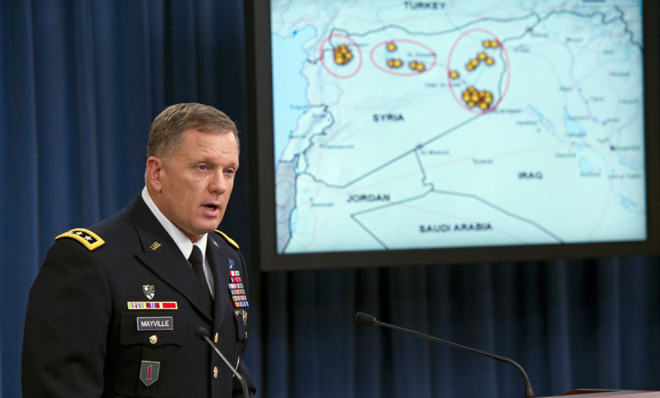8 things you probably didn't know about the terrorist group Khorasan
Here are some key facts about the "new" terrorist group and the U.S.'s response to it

A free daily email with the biggest news stories of the day – and the best features from TheWeek.com
You are now subscribed
Your newsletter sign-up was successful

Until just a few days ago, Khorasan, a terrorist group, was virtually unknown to most Americans. It was created by seasoned al Qaeda members in Pakistan, Yemen, and Afghanistan who traveled to Syria. While "Khorasan" may be an ancient term for an Islamic empire, this group, unlike ISIS, isn't primarily interested in grabbing territory and establishing a so-called "caliphate" in the Middle East. Instead, it wants to pull off another 9/11-type attack on the U.S. and Europe.
That's why the United States attack Monday night on ISIS included a strike on Khorasan. The director of national security, James Clapper, publicly acknowledged the group for the first time last week and said it was operating in both Syria and Iraq. As a result, he said, "There [was] potentially yet another threat to the homeland… yes."
Here are 8 other things you may not have known about this "new" terrorist group and the U.S.'s response to it:
The Week
Escape your echo chamber. Get the facts behind the news, plus analysis from multiple perspectives.

Sign up for The Week's Free Newsletters
From our morning news briefing to a weekly Good News Newsletter, get the best of The Week delivered directly to your inbox.
From our morning news briefing to a weekly Good News Newsletter, get the best of The Week delivered directly to your inbox.
1: The group's leader is Muhsin Al-Fadhli, a 33-year-old Kuwait native described as short, slight, and steely-eyed, and one of the few top al Qaeda commanders who knew about the 9/11 terror attacks in advance. Previously affiliated with the terrorist Abu Musab al-Zarqawi, Fadhli was identified by the State Department as an al Qaeda leader in Iran in 2012. He ultimately left Iran for Syria.
2: Fadhli first began working with Jabhat al Nusra, an al Qaeda affiliate based in Syria, but at some point broke away from that group and developed a new focus on so-called external operations. That's according to one of Fadhli's bodyguards, Abu Rama, recently arrested by Syrian President Bashar al Assad's government, CNN reported.
3: Fadhli fought for al Qaeda in northern Afghanistan and also fought against Russian forces in Chechnya. The United Nations says it was there he learned how to operate firearms, antiaircraft guns, and explosives.
4: Nicholas Rasmussen of the National Counterterrorism Center said Khorasan has focused on developing explosives that it can use to destroy aircraft in high-profile attacks against the West. The group believes airplanes are a symbol of the West.
A free daily email with the biggest news stories of the day – and the best features from TheWeek.com
5: The group is "establishing routes in Syria in order to advance attacks against the West," Lt. General William Mayville, the Joint Chiefs of Staff's director of operations, said at a recent Pentagon briefing.
6: The group has been centered in Aleppo, the largest city in Syria, under the protection of al Qaeda's official wing in the country, ABC News reported.
7: In the bombing operations launched this week against ISIS and other terror groups by the U.S. and a coalition of Middle East partners, the United States was alone in targeting the Khorasan group, reported NBC News. It also said intelligence agencies had requested the airstrikes against Khorasan as a last-minute add-on.
8: The group represented an imminent threat against the U.S. — and Mayville said recently that the U.S. now needs some time to assess the results of the targeted airstrikes and other attacks conducted this week.
More from The Fiscal Times...
-
 Are Hollywood ‘showmances’ losing their shine?
Are Hollywood ‘showmances’ losing their shine?In The Spotlight Teasing real-life romance between movie leads is an old Tinseltown publicity trick but modern audiences may have had enough
-
 A dreamy long weekend on the Amalfi Coast
A dreamy long weekend on the Amalfi CoastThe Week Recommends History, pasta, scenic views – this sun-drenched stretch of Italy’s southern coast has it all
-
 Can foster care overhaul stop ‘exodus’ of carers?
Can foster care overhaul stop ‘exodus’ of carers?Today’s Big Question Government announces plans to modernise ‘broken’ system and recruit more carers, but fostering remains unevenly paid and highly stressful